UAPA, Stan Swamy, Congress, Kejriwal, Badal & Farmers’ Movement
Conditioned only to read what is published, and not trained at all in reading what is not published, most of us are ill-equipped to read the headlines that do not appear in newspapers or in our television debates or make it to our social media handles. Unfortunately, real politics is often played out, sides are decided and battles are won or lost in this nebulous zone of conspiratorial silence. Senior Journalist and anchor SP Singh makes sense of the said and the unsaid.
![Conditioned only to read what is published, and not trained at all in reading what is not published, most of us are ill-equipped to read the headlines that do not appear in newspapers or in our television debates or make it to our social media handles. Unfortunately, real politics is often played out, sides are decided and battles are won or lost in this nebulous zone of conspiratorial silence. Senior Journalist and anchor SP Singh makes sense of the said […]](https://www.theworldsikhnews.com/wp-content/uploads/2021/07/UAPA-360x266.jpeg)
THE DEATH OF JESUIT PRIEST FATHER STAN SWAMY AND its aftermath has once again underlined this crucial inability of our hordes to read between the unpublished lines, even as vast chunks of Punjab’s populace is currently involved in a robust agitation against the Centre on an issue that may decide the future of this part of the world.
How many Punjabis have noticed that of the entire bunch of chief ministerial hopefuls and claimants, including the incumbent Captain Amarinder Singh, Akali supremo Sukhbir Singh Badal, AAP dictator Arvind Kejriwal or his hand-picked clones/clowns in Punjab, or even loudmouths like Navjot Singh Sidhu or sober statesmen like Sunil Kumar Jakhar, not one has said a single word about the death of Father Stan Swamy? And how many have taken note of this pregnant silence?

Once again, do you think politicos like Amarinder Singh or Sukhbir Singh Badal or Kejriwal forgot to condemn the muscular approach of the Centre or the apathy of the top judiciary because there is always so much happening on the political front, or such silence must be the result of a very well thought out cost-benefit analysis in a state like Punjab that is to go to the polls within a few months?
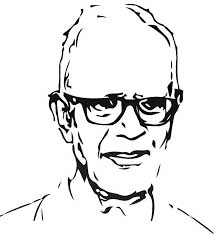
The real tribute to Father Stan Swamy is to ask the most seditious question of our politics: how dishonest can dishonesty be?
Understanding this silence is an exercise in peeling the layers and unpacking the nuances of Punjab politics. At one level, it also exposes a certain unity of approach towards some of the core issues that define what kind of a people we are, and how our politics wants to mould us.
Congress president, interim or mummy of the next one, Sonia Gandhi, wrote a letter to the President of India, co-signed by three of her party’s chief ministers, besides a bunch of other opposition politicians, demanding accountability for those who directly or indirectly contributed to the death of the tribal rights activist in judicial custody.
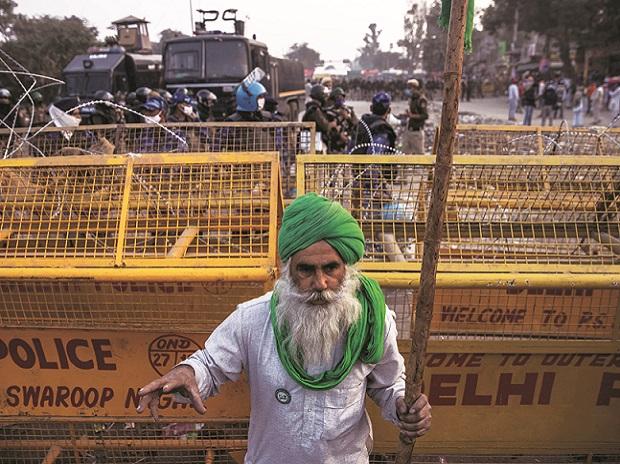
It was not very long ago that prominent sections of Punjab’s agitating farmer unions were carrying out a protest march to demand the release of several civil liberties and human rights activists, including Father Stan Swamy. In fact, India’s heavily pro-establishment media had attacked the farmer unions for such support to what it called sympathisers of “Maoists” and “separatist elements”.
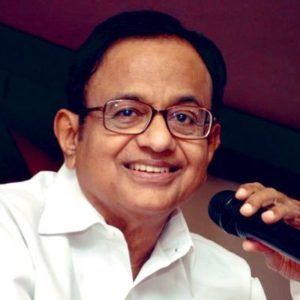 While the opposition Congress party did make an occasional noise to demand the release of activists like Swamy, Sudha Bharadwaj, Vernon Gonsalves, Arun Ferreira and Anand Teltumbde, the fact remains that many of them languished in jail for weeks, months and years because of certain draconian provisions in the Unlawful Activities (Prevention) Act (UAPA), introduced by the UPA government, when the Union Home Ministry was under the tutelage of P Chidambaram.
While the opposition Congress party did make an occasional noise to demand the release of activists like Swamy, Sudha Bharadwaj, Vernon Gonsalves, Arun Ferreira and Anand Teltumbde, the fact remains that many of them languished in jail for weeks, months and years because of certain draconian provisions in the Unlawful Activities (Prevention) Act (UAPA), introduced by the UPA government, when the Union Home Ministry was under the tutelage of P Chidambaram.
The UAPA was brought in to crush what clearly was a movement born out of poverty, skewed development, misplaced priorities and marginalisation of the poorest. As the Naxalbari insurgency reared its head, the Indian state armed itself with UAPA to term anyone and any activity as “unlawful” and weaponised terms like “sovereignty” and “territorial integrity.”
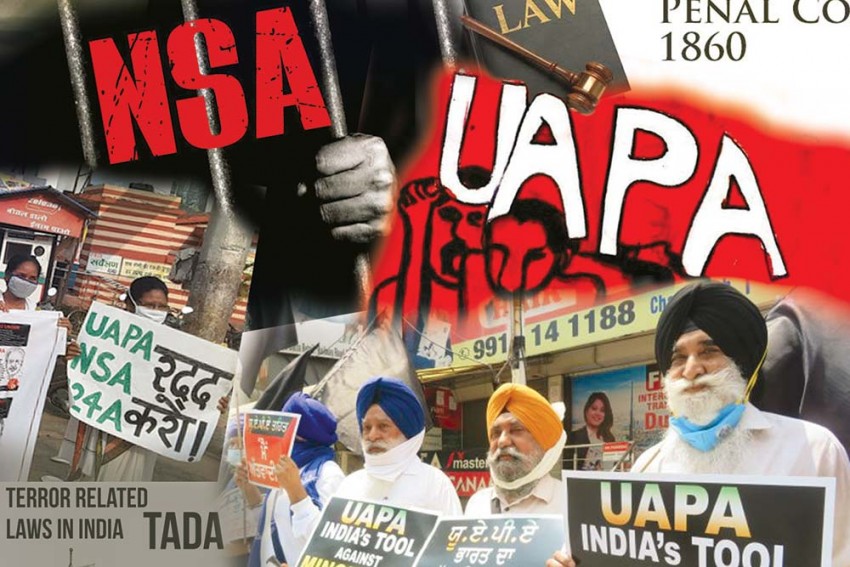
In the same vein, laws like TADA and POTA were brought in as weapons to first crush the Sikh aspirational movement and later anyone fighting back against state repression. When POTA had to be repealed after widespread misuse, the Centre expanded the scope of the UAPA and the worst of POTA was injected into this infamous law.
 Even two days before his death, Stan Swamy had moved the Bombay High Court, challenging Section 43D(5) of UAPA, which basically restricts the courts from granting bail, requires that the judge must only be satisfied that a “prima facie” case exists against the accused as per the prosecution diary. This provision was injected into the UAPA by P Chidambaram in December 2008, a shackle on the judiciary that was further tightened in 2019 by the apex court that further defined “prima facie” even more narrowly, saying the courts must not analyse evidence or circumstances and must only look at the “totality of the case” presented by the state.
Even two days before his death, Stan Swamy had moved the Bombay High Court, challenging Section 43D(5) of UAPA, which basically restricts the courts from granting bail, requires that the judge must only be satisfied that a “prima facie” case exists against the accused as per the prosecution diary. This provision was injected into the UAPA by P Chidambaram in December 2008, a shackle on the judiciary that was further tightened in 2019 by the apex court that further defined “prima facie” even more narrowly, saying the courts must not analyse evidence or circumstances and must only look at the “totality of the case” presented by the state.
The proviso puts the onus on the accused to prove his innocence but bars the court from evaluating available evidence.
Also, in 2019, the Modi government amended the UAPA to arm itself with powers to designate individuals as terrorists.
All through the debate on the Modi government going after civil liberties activists, and the tragic death of Stan Swamy, as well as the rather meek protestations by the Congress in the aftermath of such a death, the debate in Punjab has failed to engage the political parties.
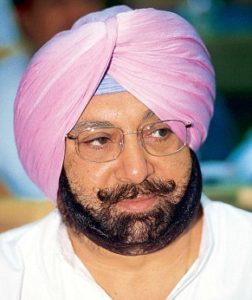 Surprisingly, all the three main contenders for power, the Badals’ Akali Dal, Amarinder Singh’s Congress and Kejriwal’s AAP, could afford to remain mum on Swamy’s death only because the sole visible and audible opposition in the region — the farmer organisations and civil society activists — seem to have decided not to question these parties.
Surprisingly, all the three main contenders for power, the Badals’ Akali Dal, Amarinder Singh’s Congress and Kejriwal’s AAP, could afford to remain mum on Swamy’s death only because the sole visible and audible opposition in the region — the farmer organisations and civil society activists — seem to have decided not to question these parties.
In fact, and shockingly, no one seems to have remembered that the Congress party had actually taken the bull by the horns and had specifically promised to apply correctives to laws like the UAPA in its 2019 Manifesto.
So revolutionary was the Congress’ Manifesto in this respect that parts of it could have been drafted by people like Father Stan Swamy.
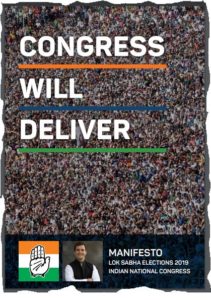 While Sonia Gandhi chose not to make any reference to her own party manifesto, Rahul Gandhi, too, remained mum on the issue and Amarinder Singh was never expected to raise it, the promises made by the party in writing ring loud and clear.
While Sonia Gandhi chose not to make any reference to her own party manifesto, Rahul Gandhi, too, remained mum on the issue and Amarinder Singh was never expected to raise it, the promises made by the party in writing ring loud and clear.
Released in the presence of Sonia Gandhi and Manmohan Singh, and drafted primarily by Chidambaram who had earlier injected steroids into the UAPA, the Manifesto declared the party’s approach in no uncertain terms.
 “Specifically, Congress promises to:
“Specifically, Congress promises to:
“Decriminalise laws that are essentially laws directed against civil violations and can be subjected to civil penalties;
“Omit Section 499 of the Indian Penal Code and make ‘defamation’ a civil offence;
“Omit Section 124A of the Indian Penal Code (that defines the offence of ‘sedition’) that has been misused and, in any event, has become redundant because of subsequent laws;
“Amend the laws that allow for detention without trial in order to bring them in accord with the spirit, and not just the letter, of the Constitution as well as International Human Rights Conventions;
“Pass a law titled the Prevention of Torture Act to prohibit the use of third-degree methods during custody or interrogation and punish cases of torture, brutality or other police excesses;
“Amend the Armed Forces (Special Powers) Act, 1958 in order to strike a balance between the powers of security forces and the human rights of citizens and to remove immunity for enforced disappearance, sexual violence and torture.
“Amend the laws to declare that every investigation agency that has the power to search, seize, attach, summon, interrogate and arrest will be subject to the restrictions imposed on the police by the Constitution, the Code of Criminal Procedure and the Indian Evidence Act; and
“Amend the Code of Criminal Procedure and related laws to affirm the principle that ‘Bail is the rule and jail is the exception:’
IF THIS INDEED was what the Congress party promised in its Manifesto, why is the party today shy of even making a reference to it as it condemns the misuse of UAPA and other laws and investigating agencies? Why is Amarinder Singh completely silent? Why is Akali Dal not bashing the Congress over its silence? Why is the AAP and Kejriwal not bashing both with this handle?
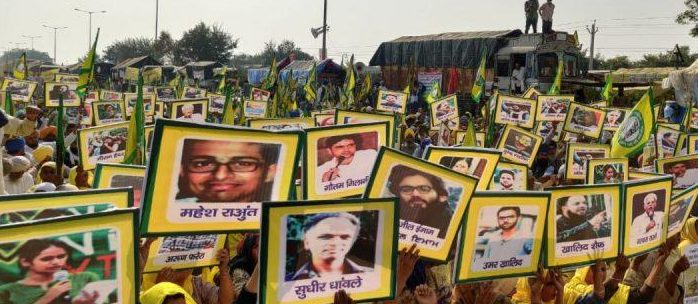
While farmer organisations like BKU (Ugrahan) raised their voice to demand the release of some leftist academics and activists in Bhima Koregaon/Elgar Parishad cases, how many Punjab politicians have made it an issue that UAPA arrests were rising in Punjab?
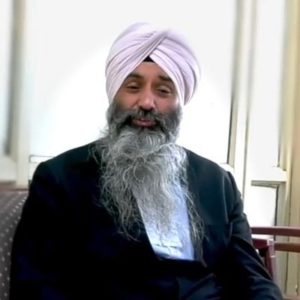 Jaspal Singh Manjhpur, who has consistently pursued such cases for years now, has claimed that at least 94 cases have been registered under the UAPA in Punjab since 2009, and 370 people were arrested in these.
Jaspal Singh Manjhpur, who has consistently pursued such cases for years now, has claimed that at least 94 cases have been registered under the UAPA in Punjab since 2009, and 370 people were arrested in these.
In fact, the Congress government of Amarinder Singh has been proactive in slapping UAPA. While just four UAPA cases were registered and 7 people were arrested in 2015 and 2016, 101 people were arrested in between 2017 and 2019 in 18 such cases.
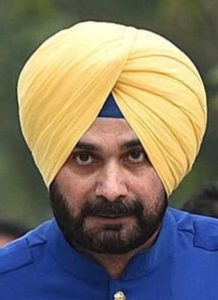
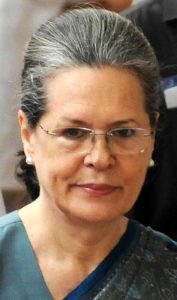 Sonia Gandhi may write letters to President after Stan Swamy’s death but is her chief minister in Punjab or her newly anointed party president Navjot Singh Sidhu even bothered about such an issue?
Sonia Gandhi may write letters to President after Stan Swamy’s death but is her chief minister in Punjab or her newly anointed party president Navjot Singh Sidhu even bothered about such an issue?
The fact remains that all three parties have divvied up their politics and do not want to be seen as principal or principled opponents to the Narendra Modi-Amit Shah line of politics. Congress in Punjab does not want to question the Hindutva politics of the BJP while the Akali Dal is more interested in returning to its identity politics turf, sharing the right of the centre space with the BJP. The AAP has already proven in Delhi that it could play the Hindutva and Nationalist cards pragmatically. Kejriwal’s temple run before the election in Delhi and his proxy slamming of the Shaheen Bagh protests planted him firmly on the Hindutva bandwagon.

That is why even when the Supreme Court, on July 14, questioned the need for the ‘colonial’ law of Sedition after 75 years of Independence and stated that it would examine its validity, Congress did not present it as its victory. The party chose not to remind anyone that it had already promised in its 2019 Manifesto a repeal of the Sedition law.
Did you see any Congressman, from Amarinder Singh right down to the mohalla committee president of the party, reminding anyone about the party’s stance on Sedition law? Even the media corps in Punjab forgets to seek Amarinder Singh’s reaction on the issue.
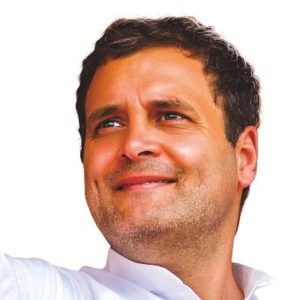 The fact is that Amarinder Singh has been running a government more in tune with the hardcore ultra-nationalist BJP than with a more liberal Rahul Gandhi line of thinking as reflected by the young scion’s Twitter handle.
The fact is that Amarinder Singh has been running a government more in tune with the hardcore ultra-nationalist BJP than with a more liberal Rahul Gandhi line of thinking as reflected by the young scion’s Twitter handle.
You will never hear Amarinder Singh slamming the BJP government over the Rafael deal, even though Rahul Gandhi has been going after Modi hammer and tongs on this score. He has not issued a single statement on how the controversy over the Rafael deal and the talk of bribery can affect the morale of the armed forces.
 He never uttered a word about Centre’s use of the CBI, never condemned Islamophobia, did not say a word about riots in Muzzafarnagar, never slammed mob lynchings, never made an issue out of arrests and detention of civil society activists, and hardly ever even tried to defend Sonia Gandhi/Rahul Gandhi in the National Herald case in which both are on bail. His politics is well aligned with the BJP’s. It never included making repeated references to the loot of the country by the likes of Vijay Mallya, Nirav Modi, Mehul Choksi etc. He does not refer to these issues even though the farmers on the Singhu Tikri border talk about the subject every single day.
He never uttered a word about Centre’s use of the CBI, never condemned Islamophobia, did not say a word about riots in Muzzafarnagar, never slammed mob lynchings, never made an issue out of arrests and detention of civil society activists, and hardly ever even tried to defend Sonia Gandhi/Rahul Gandhi in the National Herald case in which both are on bail. His politics is well aligned with the BJP’s. It never included making repeated references to the loot of the country by the likes of Vijay Mallya, Nirav Modi, Mehul Choksi etc. He does not refer to these issues even though the farmers on the Singhu Tikri border talk about the subject every single day.
It takes a lot of effort to curate such a silence. Amarinder Singh started early and has practised a lot. He remained silent on beef ban, love jihad, ghar wapsi, Ishrat Jahan encounter, the assault on JNU student leaders, the suicide of Rohit Vemula. He has been practising silence for a long, long time. The man has serious ED cases going on against him.
Who can forget the fact that Amarinder Singh actually wrote an article in the Indian Express, demanding a bravery medal for the Indian Army Major who trussed up an innocent Kashmiri man on a jeep and used him as a human shield against stone pelters?
 Who can forget the fact that Amarinder Singh actually wrote an article in the Indian Express, demanding a bravery medal for the Indian Army Major who trussed up an innocent Kashmiri man on a jeep and used him as a human shield against stone pelters? He wrote an article in The Tribune, advocating a free hand for the Army in Kashmir and termed any resultant corpses as collateral damage.
Who can forget the fact that Amarinder Singh actually wrote an article in the Indian Express, demanding a bravery medal for the Indian Army Major who trussed up an innocent Kashmiri man on a jeep and used him as a human shield against stone pelters? He wrote an article in The Tribune, advocating a free hand for the Army in Kashmir and termed any resultant corpses as collateral damage.
Which part of this is aligned with Rahul Gandhi’s stated line of thinking?
Then why are his political rivals not questioning Amarinder Singh on his politics?
Why is Navjot Singh Sidhu not taking upon Amarinder Singh head-on on these core issues?
Why is Akali Dal not calling Amarinder Singh bluff?
Why is the AAP not calling the Congress’ and the Akali Dal’s bluff?
And the most important question: why is a robust movement being seen as a renaissance in Punjab’s politics not posing these serious questions to the entire political class?
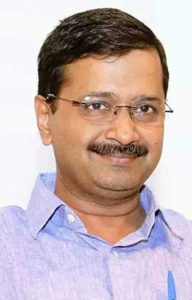 It will matter little as to which face AAP chooses as its CM candidate, or if Navjot Sidhu becomes the party chief in Punjab today or a CM tomorrow, or if Sukhbir Singh Badal finally returns to power, as long as our politics remains hostage to ideological confusions, pragmatic silences, programmed communal responses, devious and incestuous subterranean understandings and a general moral bankruptcy.
It will matter little as to which face AAP chooses as its CM candidate, or if Navjot Sidhu becomes the party chief in Punjab today or a CM tomorrow, or if Sukhbir Singh Badal finally returns to power, as long as our politics remains hostage to ideological confusions, pragmatic silences, programmed communal responses, devious and incestuous subterranean understandings and a general moral bankruptcy.
The movement about the three farm bills could be a trigger for a bold return to the core issue of intellectual bankruptcy, or it could be a shroud you can use to cover up a murder of a renaissance.
The real tribute to Father Stan Swamy is to ask the most seditious question of our politics: how dishonest can dishonesty be? Read the headlines that are not being published. Take charge of the debates that are not happening on your television sets. All revolutions start from deep within.
